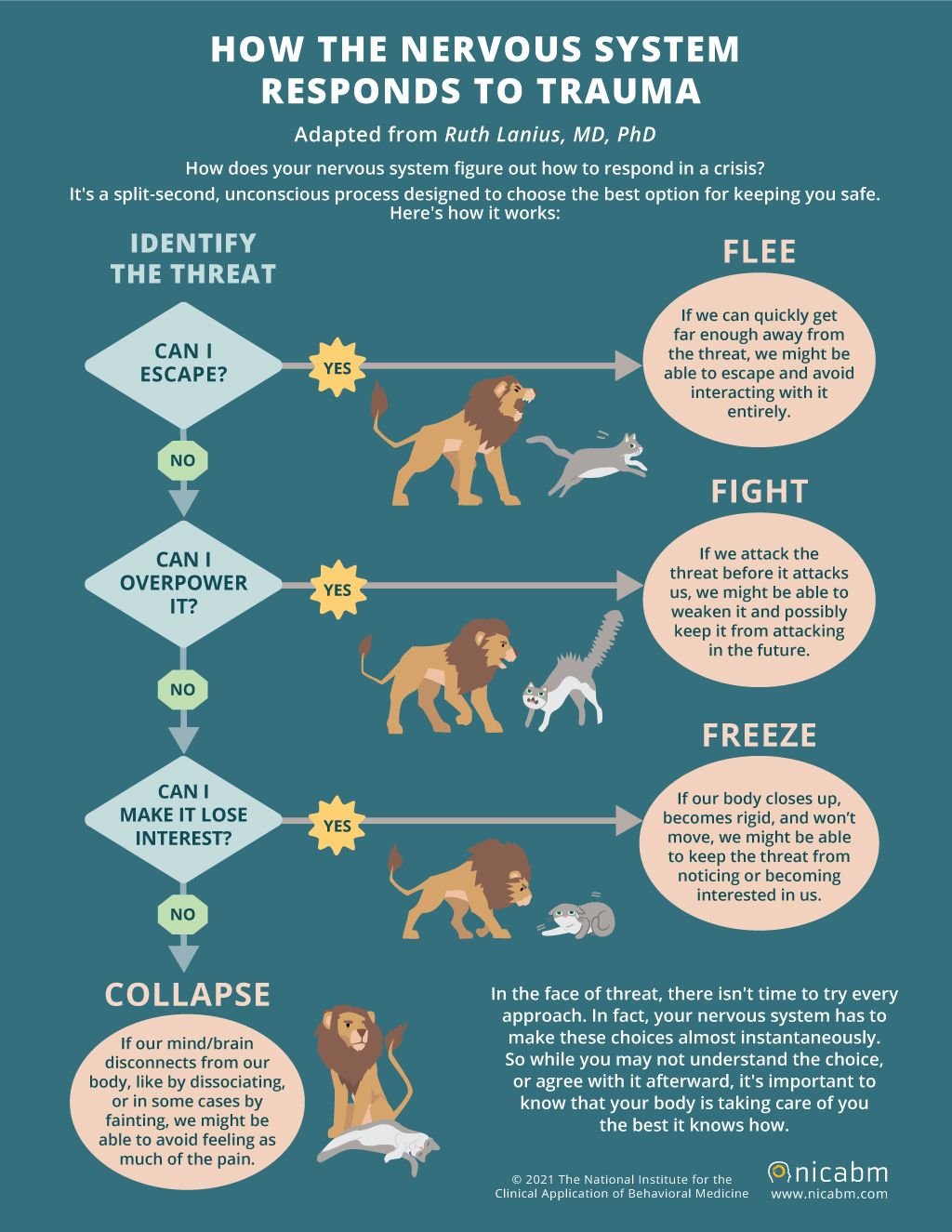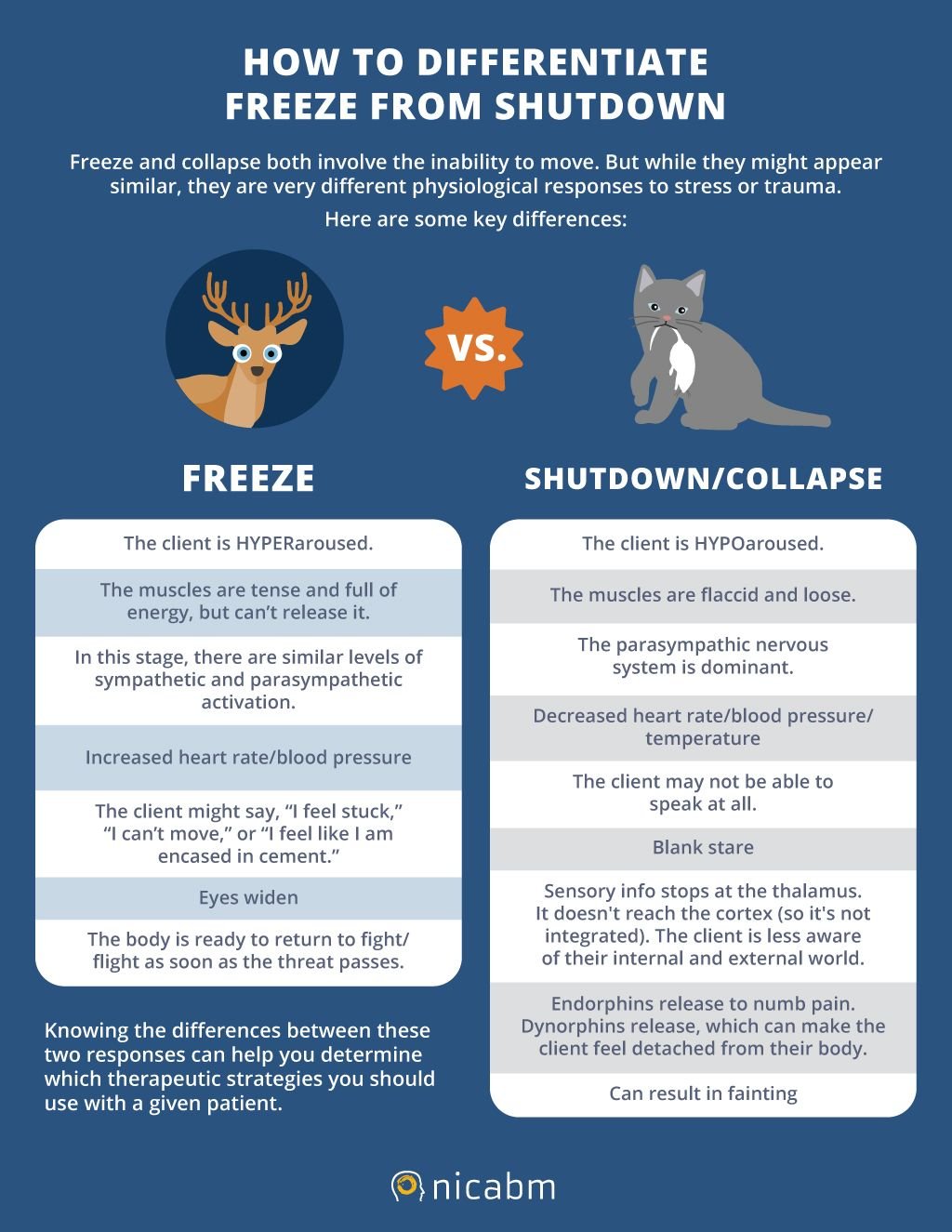Understanding our Freeze & Collapse Trauma Responses.
You may be very familiar with the term “fight or flight”, and you might also be curious about the purposes and neurological mechanisms that are behind that system. As a therapist who works primarily with clients who are experiencing chronic stress or who have experienced trauma, I see the ways that fear and stress responses impact people’s daily lives.
There are more than just two ways our bodies can react to a perceived threat. We can find ourselves attempting to fight or flee from the threat, but we may also react in ways that are less talked about; we might “freeze” or even “collapse”. Our limbic system is the part of our brain in charge of our fear responses. This part of our brains is highly evolved and attuned to perceiving threats, and can become even more sensitive to certain environments if we have experienced a trauma, causing anxiety even after the person is “safe” again.
The point that I want to make the most clear when talking about our automatic threat responses is just that. They are automatic. We do not have a choice in how our bodies react during a highly traumatic or stressful situation, because our nervous system steps in and temporarily takes over in order for us to survive the threat. There is quite a large stigma in our culture about how people “should” or “shouldn’t” respond to a traumatic situation. Comments like, "Well why didn’t they try to fight or run away?” are incredibly harmful, and are indicative of a culture that does not understand our biological responses to fear. By understanding and normalizing the entire fear response spectrum from fight to collapse, we can create more compassionate language in the way we respond to survivors.
Freeze response can be thought of as the “deer in headlights” response. We know that there is a threat but our bodies become frozen with sympathetic, hyper-aroused energy. In other words, the fear response has been turned on, and the heart rate increases so that oxygen can flow to the muscles. This immobility is not a choice, it is our body’s way of trying to prepare for the next step but it is unable to release the energy until the threat passes. Clients will often describe this experience as “I felt stuck” or “I couldn’t move” or “I felt paralyzed”. The long term effects of a freeze response can look like anxiety, chronic pain, migraines, and other body based symptoms.
The collapse response looks very different from freeze from a biological perspective. Collapse is a state of hypo-arousal. When a person begins to experience this response, they may not be able to speak, and they feel detached or disconnected from their body. Their heart rate, blood pressure, and body temperature lower. If you are with someone in this state, you may notice they have a “blank stare” as they become less aware of their internal and external world. There is a decrease in muscle tone, as the body is no longer attempting to fight or flee from the response. This is a fear response that can lead to a person fainting.
If you have experienced any of these responses at some point in your life, you understand how confusing it may feel to not be in control of your own body. Understanding that your body did its best in order to protect you may help you reframe the experience if you struggle to make sense of your reaction. Much of the work I do with clients is providing a space for them to process their experience and then regain control of the beliefs they have attached to traumatic moment. Therapy can be a helpful tool in understanding and managing your own fear and responses. If you want to know if therapy might be right for you, please take a look at my FAQ page.
Source: https://www.nicabm.com/how-the-nervous-system-responds-to-trauma/
Source: https://www.nicabm.com/the-difference-between-freeze-and-shutdown-trauma-responses/
DISCLAIMER
This blog is for educational purposes only. The information contained in this blog article is not intended to be a replacement for mental health care. If you are experiencing a mental health crisis, please call 1-800-273-TALK or text HOME to 741741 for free 24/7 support in the U.S.
ABOUT THE AUTHOR
I am a licensed clinical social worker and owner of Victoria Smith, LCSW, Inc., an online and in-person therapy practice focused on helping adults of all ages heal trauma and symptoms of PTSD, recover from perfectionism, and connect more with their emotional experiences so they’re able to live more fulfilling, connected lives. If you’re a California resident, schedule a free consultation call to learn more.



